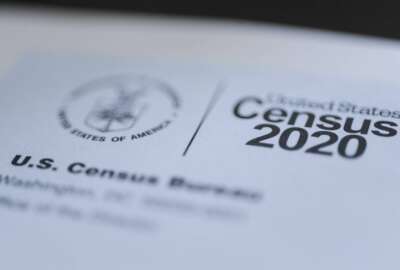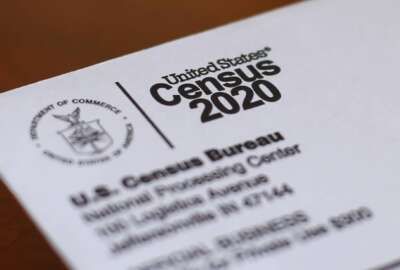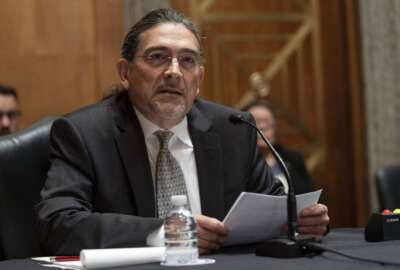
The Census Bureau gets a report card on how it learns its lessons
The Census Bureau is already applying lessons learned from the 2020 decennial count in preparing for 2030 and even 2040. For one thing, it learned how to lower...
The Census Bureau is already applying lessons learned from the 2020 decennial count in preparing for 2030 and even 2040. For one thing, it learned how to lower costs through employee productivity, so 2020 came in nearly $2 billion under budget. The Government Accountability Office (GAO) reports that the Census Bureau could tighten up its internal feedback loop even more. For more on that, the Federal Drive with Tom Temin spoke with Yvonne Jones, GAO’s director of Strategic Issues.
Interview transcript:
Tom Temin The dominant impression I get from the report is that, really the Census Bureau pulled off a minor miracle to get this count done fairly on time, given COVID and way under budget. It’s a wonder they don’t just make it all up. But this is a real count, isn’t it?
Yvonne Jones Yes, it is.
Tom Temin And so the idea of lessons learned, I want to start there. I didn’t realize after using that expression a hundred million times myself and hearing it a billion time. There’s actually an eight-step lessons learned process that GAO has identified. Let’s start there.
Yvonne Jones We’ve done quite a bit of research in this area, and we defined a lessons learned exercise as a systematic set of steps for agencies to learn from an event and decide when and how to use that information to change their behavior. So you’re right, there are eight steps. So very briefly. First, an agency collects information, then it analyzes it, then it goes through a process to validate any lessons that it feels it has acquired through the collecting and analyzing of the data. Then it has to store or save the lessons for current and future use. It shares the lessons in the agency, then management will decide whether to spend money to apply the lessons to the agency’s activities. And then, they will try to see if there are changes in the behavior of staff and others to verify if the lessons were learned. And then, as a final step, they will evaluate the lessons by comparing the money spent to the results obtained.
Tom Temin All right. And you found that the Census Bureau is doing seven of those eight steps. Which ones do you recommend that they add?
Yvonne Jones Well, it’s the eighth step, which is evaluating the lessons by comparing the money spent to the results obtained. As you said earlier, the census was carried out in a different way, this past time, because of many different factors among which were the COVID pandemic. So while the census has a good understanding of the steps of lessons learned, they did not have the opportunity in the 2020 census to evaluate the lessons by comparing the money spent to the results obtained.
Tom Temin And then looking for 2030 then, the lessons from the displacements or the changes in plans caused by the COVID. I would imagine that’s a difficult thing to bake into your next plan, because maybe there won’t be a pandemic. And then what do you do? Is that one of the questions they’re facing?
Yvonne Jones Well, certainly they do need to understand how what happened, in terms of both their schedule and cost estimates, how these factors were impacted by all of the changes that required were required in in the 2020 census. But the census collects quite a bit of information, itself. For example, it archives a monthly snapshot of its master schedule file. And that’s the way it manages the schedules for all the census activities. Then it can go back later and compare what actually happened to what the estimated schedule was. They have done some of that for the 2020 census. We feel that they could deepen and broaden that process, and in doing so, that they would incorporate that into their preparations for the 2030 census. And they would also understand more where they were on point, and perhaps, a bit off point in the 2020 census.
Tom Temin We’re speaking with Yvonne Jones, director of strategic issues at the Government Accountability Office. So it sounds like they may not know the dollar cost of each thing, but they know the ratios and they can adjust the proportions of money devoted to different activities from this feedback, even if the gross numbers might be different because of changing prices for technology.
Yvonne Jones They actually know the numbers and the time differential in a number of cases. Not necessarily for every case, because as they informed us, they had to make a lot of changes very quickly because of unexpected events like the pandemic. But they would be aware of a lot of the quantitative elements. And they do have the capacity for collecting more information for the elements for which they don’t have as much detail.
Tom Temin And they found, you found, that they found that some costs that they anticipated came in higher and some came in lower, even though the overall tab was less than anticipate. And so how do you reconcile that? What should they do with that information?
Yvonne Jones First of all, the census has been engaged in a process of trying to reduce the rate of growth of the census for over a decade. And as a matter of fact, with a $13.5 billion cost, that’s the estimate as of September of 2022 as compared to the estimated cost of 15.6 billion. Yes, it does represent a $2 billion decrease from the original estimate. But I think, more importantly, one should understand that the rate of growth of the increase of the cost has come down quite a bit. There was a 15% increase in cost between the 2000 and the 2010 census. There was a 7.4% increase in the rate of growth of the cost between the 2010 and the 2020. So that shows that some of the efforts that they undertook to reduce cost have in fact worked.
Tom Temin One of the causes of a large increase in cost in 2010, I believe, was they were not very good at integrating technology. At the last minute, they had to go to paper and hire a contractor to process paper. But they learned how to apply a lot of new technologies in time for 2020.
Yvonne Jones Yes, they did.
And so getting into 2030, do you feel overall, looking at their lessons learned process, which is seven-eights of the way done there and the fact that they understand their costs in great detail, they should be pretty confident that 2030 could go smoother than 2020 in the absence of some kind of national emergency that affected pretty much the entire economy.
Yvonne Jones What we think is that the census is increasing its ability, first of all, to obtain clear, reliable data on both the cost and the scheduling aspects. And that provides them with a baseline against which they can compare the cost of the various projects and programs of the census, even while the census is underway. What we did find is that the Census Bureau is different from other agencies. Because, for example, when we examined the work schedules from other federal agencies, we don’t often see that the agencies have saved as much valuable information, for example, in monthly snapshots of master schedule file data that the census has. And so what that allows the census to do is to have a better sense of the quality and reliability of their estimate. Then they can look at the costs and the progress of the schedule as they go along in the 2030 census. If they continue to incorporate changes that we and they have identified, and hopefully, because we don’t know exactly what’s going to happen in the future, that will allow them to better plan and execute the 2030 census.
Tom Temin I guess maybe they think of the census as a continuous process, a ten-year process, in some cases, longer than a ten-year process. It’s a rolling, overlapping process with the enumeration itself happening periodically. But really, the census never ends then, does it in that sense?
Yvonne Jones No, that’s correct. The Census Bureau starts planning for decennial census about 14 years before the census is actually carried out. So that means that there is an overlap between whatever the next census is and then the one that comes after the next census. So, yes, there is an overlap.
Tom Temin And your specific recommendation? And did they agree with it?
Yvonne Jones Yes, we have two recommendations and the Census Bureau agrees with both of them. So the first one, is that the director of the census should document and take steps during the 2030 census to evaluate the bureau’s lessons learned process, because as I mentioned earlier, they cannot fully carry out this process during the 2020 census. And our second recommendation is also that the director of the census should include steps in the 2030 census schedule management plans for learning lessons, and that should be based on a systematic after the fact evaluation of the schedule data.
Tom Temin And they accepted those recommendations?
Yvonne Jones Yes.
Copyright © 2025 Federal News Network. All rights reserved. This website is not intended for users located within the European Economic Area.
Tom Temin is host of the Federal Drive and has been providing insight on federal technology and management issues for more than 30 years.
Follow @tteminWFED





